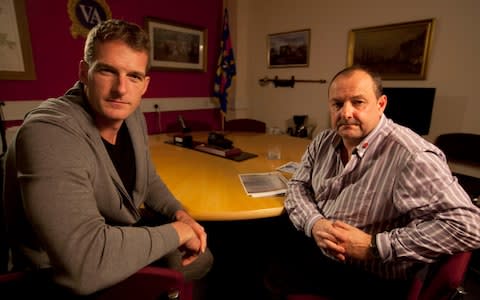World War One’s Secret Shame: Shell Shock, review: a powerful report on how we're still failing our veterans
Private James Smith had already served four years in the army by 1914. After enduring Gallipoli and the Somme, he was sent to Passchendaele where his refusal to fight earned him the death penalty. Men from his own battalion were ordered to shoot him but deliberately missed, apart from one who maimed him. An officer tried to deliver the coup de grace, but couldn’t, so ordered a soldier to do it instead.
“The guy was a hero,” concluded Dan Snow, after a tearful encounter with Private Smith’s great great nephew Charles Sandbach 100 years on. How our perceptions change. Or do they?
In World War One’s Secret Shame: Shell Shock (BBC Two) Snow argued that the military has not vastly enlarged its capacity to care for those who incurred psychiatric trauma in uniform. Close to the trenches on the western front, the Army installed psychiatric treatment units, but only so that it could restore jibbering wrecks to battle-worthiness. No matter that the afflicted might be unable to walk straight or could not control facial spasms – the evidence survives in disturbing footage.
Snow honoured the enlightened psychologists who identified this new illness (though oddly omitted WHR Rivers, who treated Siegfried Sassoon and Wilfred Owen; nor did he quote Owen’s devastating Mental Cases). But to what end? A century on, the armed forces simply don’t have the capacity to fulfil a duty of care for damaged ex-servicemen and women. They’re society’s problem now, an MoD spokesman more or less said, and it’s the NHS’s job to mop up the mess.
Snow interviewed Dave Brown, a former para who still hasn’t recovered from the carnage at the Battle of Goose Green in 1982. The Army exploited his aggressive streak. “They want you that way,” he said with a tight smile. “But when you’re leaving they don’t actually tell you how to turn that light switch off.”

Nor does it necessarily tell sufferers there’s anything wrong. The Army suspected that Sean Jones had PTSD in 2009 but still sent him back to Afghanistan, and only told him last year. “To me that was quite an annoyance,” he said quietly. It’s only a promise to his wife that prevents him acting on suicidal urges.
Snow, who admits to getting excited about deadly manoeuvres from the safety of wood-panelled libraries, had the humility to feel rebuked by this testimony from men who have internalised the violence of war. After the Armistice, a War Office enquiry was set up to look into shell shock. The conclusion? “It must be looked upon as a form of disgrace.” Perhaps, now that so much more is known and so little done to support veterans, the disgrace is ours.